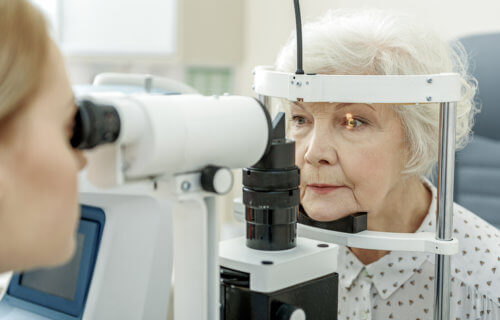SEATTLE — Cataracts affect most older adults at risk of developing dementia. New research now shows strong evidence that cataract surgery may provide seniors with a powerful shield against debilitating cognitive decline.
The study of more than 3,000 participants over 65 finds that people who had undergone cataract surgery had a nearly 30 percent lower risk of developing dementia from any cause compared with those who did not. What is more, this lowered risk persisted for at least a decade after surgery and this specific treatment was also linked with a lower risk of Alzheimer’s disease.
“This kind of evidence is as good as it gets in epidemiology,” says the study’s lead researcher, Dr. Cecilia Lee, an associate professor in ophthalmology at the University of Washington School of Medicine, in a statement. “This is really exciting because no other medical intervention has shown such a strong association with lessening dementia risk in older individuals.”
Despite the positive finding, researchers could not explains the reason that cataract surgery lessens the risk of dementia. They believe, however, that people may be getting “higher quality sensory input” after cataract surgery, which might be beneficial to the brain. “These results are consistent with the notion that sensory input to the brain is important to brain health,” said the study’s principal investigator and co-author Dr. Eric Larson, a senior investigator at Kaiser Permanente’s Health Research Institute in Seattle.
Dr. Lee went on to explain that another potential explanation is that after the surgery, people are getting more blue light. “Some special cells in the retina are associated with cognition and regulate sleep cycles, and these cells respond well to blue light,” she says. “Cataracts specifically block blue light, and cataract surgery could reactivate those cells.”
How the eyes are linked to dementia risk
The study’s results drive a strong case for further research to be carried out on the eye-brain connection in dementia. Previous studies by Dr. Lee and her team have shown a strong link between other retinal diseases, such as age-related macular degeneration of the retina, and the development of Alzheimer’s disease and dementia. In this latest work, the researchers tracked participants who were diagnosed with a cataract or glaucoma, but did not have dementia at the time they volunteered for the study.
The participants also hadn’t undergone a cataract surgery at their time of enrollment. They were then evaluated every two years and their cognitive abilities were measured using an instrument that scored them in a range from zero to 100. Participants who scored less than 85 were sent for more neurological tests.
During a follow-up of the 3,038 patients, 853 developed dementia, with 709 cases of Alzheimer’s disease. Half of the participants who had undergone cataract surgery in either eye were about 30 percent less likely to develop any form of dementia for at least ten years after their surgery.
The researchers factored in a huge range of variables, such as excluding those who had undergone surgeries in the two years before their dementia diagnosis. They did this to rule out the possibility that people with cognitive decline prior to their diagnosis may have been less conscious of vision issues and then less likely to have sought out surgical treatments. Even by excluding this group, the researchers report lower risks of dementia associated with cataract surgery.
“Innovative research like Dr. Lee’s is helping to uncover how age-related changes in our senses contribute to dementia,” says Dr. Howard Fillit, the founding executive director and chief science officer of the Alzheimer’s Drug Discovery Foundation (ADDF). The ADDF is a nonprofit that accelerates the discovery and development of drugs to treat and prevent Alzheimer’s disease and related dementias. The agency has supported Dr. Lee’s work to develop new diagnostic tools for Alzheimer’s that use non-invasive imaging of the retina and artificial intelligence.
The study’s findings were reported in the JAMA Internal Medicine journal.
South West News Service writer Georgia Lambert contributed to this report.
